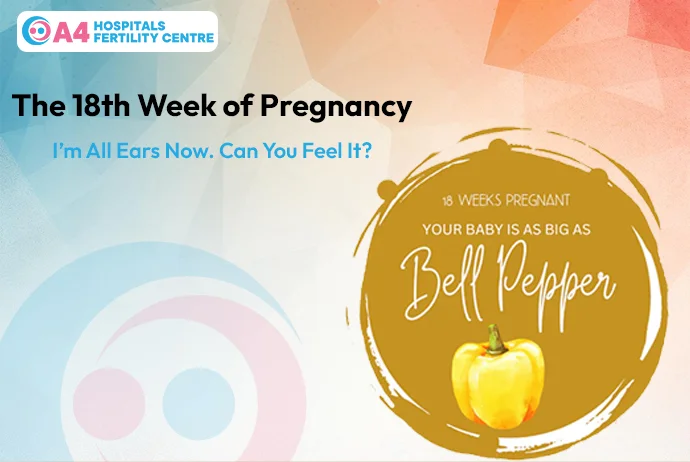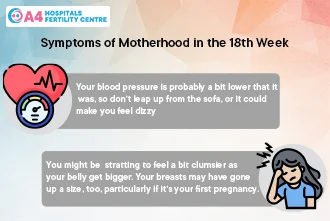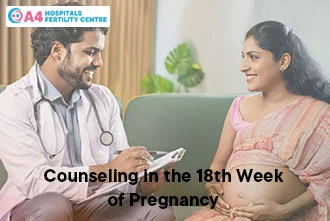
Dr. Aruna Ashok MBBS, MS OG, DNB OG
- Clinical Director

Congratulations on reaching the 18th week of your pregnancy! This is an exciting time as your baby is now developing the ability to hear. You might be wondering, “Can my baby really hear me?” Yes, they can! Your baby’s ears are almost in their final position, and the tiny bones in their ears are starting to harden. This means your little one is becoming more aware of the sounds around them, including your voice.
Imagine your baby listening to your heartbeat, the gurgles of your digestive system, and even the sound of your voice as you read or talk to them. It’s a great time to start engaging with your baby by speaking to them, singing, or even playing music. This interaction not only helps in their auditory development but also strengthens the bond between you and your baby.
At this stage, your baby is around the size of a bell pepper and weighs about 7 ounces. They are growing rapidly, and you might start to feel those first fluttering movements, known as “quickening.” These gentle flutters are your baby’s way of saying, “I’m here!” It’s a magical moment that many mothers cherish.
Feeling your baby move for the first time can be both exciting and reassuring. However, it’s perfectly normal if you haven’t felt these movements yet. Every pregnancy is different, and some women might not feel these movements until the 20th week or later. If you’re unsure or concerned, don’t hesitate to talk to your doctor.
A great way to connect with your baby is to attend birthing classes, like those offered by A4 Fertility Centre. These classes provide valuable information about pregnancy, childbirth, and postpartum care. They also offer a supportive environment where you can ask questions and share experiences with other expectant mothers.
In these classes, you will learn techniques to relax and communicate with your baby. For instance, you might practice prenatal yoga, which not only helps in staying fit but also encourages mindfulness and a stronger connection with your baby. Additionally, understanding the stages of labor, pain management techniques, and breastfeeding tips can prepare you for the journey ahead.
Are you feeling those first movements yet? It’s such a special time! Share your experiences with your loved ones, and don’t forget to take care of yourself. Rest, relax, and enjoy this beautiful journey. If you have any concerns or just want to talk, your healthcare provider is always there to listen.


As you progress into the 18th week of your pregnancy, you might notice a range of symptoms that reflect the incredible changes happening in your body. Each symptom is a reminder of the little life growing inside you. Here’s what you might expect this week.
One of the most common symptoms is feeling more energetic than in the previous weeks. The fatigue that plagued you during the first trimester often gives way to a new sense of vitality. Enjoy this burst of energy by engaging in light exercises, such as walking or prenatal yoga, which are beneficial for both you and your baby.
You may also notice an increase in your appetite. Your baby is growing and needs more nutrients, so it’s important to eat a balanced diet rich in vitamins and minerals. However, be mindful of what you eat to ensure you’re getting the right nutrients without overindulging in unhealthy foods.
Another common symptom is back pain. As your uterus expands, it shifts your center of gravity, and your back muscles have to work harder to support your growing belly. To alleviate back pain, try practicing good posture, wearing comfortable shoes, and using a support pillow when you sleep.
Skin changes are also common during this period. You might notice a dark line running from your belly button to your pubic bone, known as the linea nigra. This is caused by hormonal changes and is completely normal. Your skin might also be more prone to stretch marks, especially on your belly, breasts, and thighs. Keeping your skin moisturized can help minimize these marks.
In addition to these physical symptoms, you might experience emotional changes. Hormonal fluctuations can cause mood swings, making you feel happy one moment and teary the next. It’s important to talk about your feelings with your partner, friends, or a counselor. Sharing your emotions can provide relief and support.
Feeling shortness of breath? As your baby grows, your uterus pushes against your diaphragm, making it harder to take deep breaths. This is normal and usually not a cause for concern. However, if you feel dizzy or have severe breathing difficulties, consult your doctor immediately.
Lastly, your breasts might feel fuller and more sensitive. This is your body’s way of preparing for breastfeeding. Wearing a supportive bra can help ease discomfort.
Remember, every pregnancy is unique, and not all women experience the same symptoms. If you’re ever in doubt about what you’re feeling, don’t hesitate to reach out to your healthcare provider. They’re there to help you navigate through this journey.
How are you feeling this week? It’s always a good idea to jot down your symptoms and share them with your doctor during your next visit. Keep communicating with your baby and enjoy this amazing experience.
Nutrition plays a vital role in ensuring a healthy pregnancy, especially as you enter the 18th week. Your baby is rapidly growing, and what you eat directly impacts their development. Here’s a guide to what you should include in your diet this week.
Firstly, make sure you’re getting enough protein. Protein is essential for the growth of your baby’s tissues and organs. Include lean meats, poultry, fish, eggs, dairy products, beans, and nuts in your meals. Aim for at least 75 grams of protein daily.
Iron is another crucial nutrient. It helps in the production of red blood cells, which carry oxygen to your baby. Iron-rich foods include lean red meat, poultry, fish, leafy green vegetables, and fortified cereals. Pair these with vitamin C-rich foods like oranges, strawberries, and bell peppers to enhance iron absorption.
Calcium is important for your baby’s bone and teeth development. Ensure you’re consuming at least 1,000 milligrams of calcium daily. Dairy products, fortified plant milks, tofu, and leafy greens are excellent sources of calcium.
Don’t forget folic acid, which helps prevent neural tube defects. Leafy greens, citrus fruits, beans, and fortified cereals are great sources of folic acid. Your doctor might also recommend a folic acid supplement.
Omega-3 fatty acids are essential for your baby’s brain and eye development. Include sources like fatty fish (such as salmon), walnuts, chia seeds, and flaxseeds in your diet. If you’re not a fan of fish, consider taking a fish oil supplement, but consult your doctor first.
Hydration is key. Drink plenty of water throughout the day to stay hydrated. Aim for at least 8-10 glasses of water daily. Staying hydrated helps with digestion, maintains amniotic fluid levels, and prevents urinary tract infections.
Fiber is important to prevent constipation, a common issue during pregnancy. Whole grains, fruits, vegetables, and legumes are excellent sources of fiber. Include a variety of these in your meals to keep your digestive system healthy.
Limit your intake of caffeine and avoid alcohol and smoking altogether. These substances can negatively impact your baby’s development. Instead, opt for herbal teas, fresh juices, and smoothies.
Consider attending A4 Fertility Centre’s Birthing classes to learn more about proper nutrition during pregnancy. These classes offer personalized dietary advice and tips on how to maintain a balanced diet, ensuring both you and your baby are healthy.
What’s your favorite healthy recipe this week? Share it with other moms-to-be in your birthing class. Eating well is a wonderful way to take care of yourself and your baby.
Counseling can be a valuable resource during your pregnancy, especially as you enter the 18th week. Emotional and psychological well-being is just as important as physical health. Here’s why counseling can make a difference and how it can support you during this journey.
Pregnancy brings a mix of emotions, from joy and excitement to anxiety and fear. It’s normal to feel overwhelmed at times. Counseling provides a safe space to express these feelings and learn coping strategies. A professional counselor can help you navigate through your emotions and prepare mentally for the changes ahead.
One common concern is managing stress. High stress levels can affect both you and your baby. Through counseling, you can learn relaxation techniques such as deep breathing, meditation, and visualization. These practices can help you stay calm and focused, promoting a healthy pregnancy.
Counseling also addresses relationship dynamics. Pregnancy can change the dynamics between you and your partner. Open communication is key to maintaining a strong relationship. A counselor can guide you and your partner on how to support each other, manage conflicts, and work together as a team.
If you have a history of mental health issues, such as depression or anxiety, counseling becomes even more crucial. Pregnancy can trigger or exacerbate these conditions. Early intervention and ongoing support can prevent complications and ensure you receive the care you need.
Many pregnant women worry about childbirth and parenting. Counseling can help alleviate these fears by providing accurate information and practical advice. Discussing your concerns with a counselor can empower you to face childbirth with confidence and prepare for the responsibilities of motherhood.
Support groups are another valuable aspect of counseling. Joining a group of expectant mothers allows you to share experiences, exchange tips, and build a support network. Knowing you’re not alone in your journey can be incredibly reassuring.
A4 Fertility Centre’s Birthing classes also offer excellent counseling resources. These classes include sessions on emotional well-being, stress management, and relationship advice. They provide a holistic approach to pregnancy care, ensuring you’re supported in every aspect.
Have you considered counseling during your pregnancy? It can be a game-changer in how you experience these precious months. Whether it’s through individual sessions, support groups, or birthing classes, reaching out for help is a sign of strength and wisdom.
As you enter the 18th week of pregnancy, certain tests are recommended to monitor your health and your baby’s development. These tests provide crucial information and help ensure a smooth pregnancy journey. Here’s an overview of the tests you might undergo this week.
One of the most common tests is the mid-pregnancy ultrasound, also known as the anatomy scan. This detailed ultrasound examines your baby’s organs, limbs, and overall development. It can also reveal your baby’s sex if you wish to know. The anatomy scan checks for any congenital abnormalities and ensures that your baby is growing as expected.
Blood tests are another important part of prenatal care. Around this time, your doctor might recommend a second-trimester blood test to screen for certain genetic conditions, such as Down syndrome, trisomy 18, and neural tube defects. This test, often called the quad screen, measures levels of four substances in your blood: AFP, hCG, Estriol, and Inhibin-A.
Your doctor might also check your blood pressure and test your urine for protein levels to screen for preeclampsia, a condition characterized by high blood pressure and damage to other organs. Early detection and management of preeclampsia are crucial for the health of both you and your baby.
If you haven’t already had one, an amniocentesis may be offered, especially if you are at a higher risk for genetic conditions. During this procedure, a small amount of amniotic fluid is extracted and analyzed for genetic information. It’s usually performed between the 15th and 20th weeks of pregnancy.
Glucose screening tests might also be recommended around this time to check for gestational diabetes. This condition can develop during pregnancy and affect both your and your baby’s health. Managing gestational diabetes through diet, exercise, and medication (if needed) is essential for a healthy pregnancy.
Attending A4 Fertility Centre’s Birthing classes can help you understand the importance of these tests and how to prepare for them. These classes provide detailed information about each test, what to expect, and how to interpret the results. They also offer support in case you have any concerns or questions.
Have you scheduled your anatomy scan yet? It’s an exciting opportunity to see your baby and learn more about their development. Make sure to keep all your prenatal appointments and follow your doctor’s recommendations. Taking these tests seriously is a key step in ensuring a healthy pregnancy.